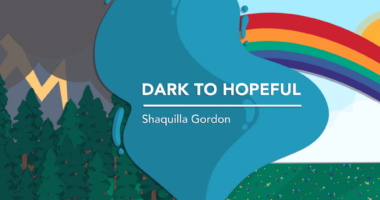When it comes to chronic illness, here’s why relationships matter
Do you know what makes people live longer and happier lives?

In 2019, I gave a TEDx talk on relationships with chronically ill patients, titled “What your sick friends and family really need most from you.” Using the correlation of food, I provided what I hope was a thought-provoking speech on what it means to befriend a sick person. My target audiences were the friends and family of anyone ill.
Today, I bring 15 years of personal insight into the effects that relationships have had on me since I was diagnosed with paroxysmal nocturnal hemoglobinuria (PNH) and aplastic anemia. I didn’t anticipate having to figure out how to navigate relationships during a diagnosis. During such a vulnerable period of my life, my mind didn’t even muster a thought about how relationships would affect me.
I recently read the Harvard Study of Adult Development, which, conducted over the span of 80 years, is one of the longest studies of adult life. Its purpose was to understand what makes people live longer and more happily. The top answer: relationships!
Robert Waldinger, the study’s director and a professor of psychiatry at Harvard Medical School, said the “surprising finding is that our relationships and how happy we are in our relationships has [sic] a powerful influence on our health. Taking care of your body is important, but tending to your relationships is a form of self-care too. That, I think, is the revelation.”
The gift of positivity
As I applied Waldinger’s study to my experience of battling chronic illnesses, I realized that relationships were the one constant in my story. I watched them change over the course of my battle, perhaps attributable to others not knowing how to handle my illness. But my relationships also brought something great to my life: positive emotions.
Life’s struggles may make us more prone to finding the light in the darkness — by searching for positivity and hope. The loneliness I felt was tough to handle, but it didn’t omit the memories I had of others who showed me compassion. What I remember most are the relationships in my life, much as the study found.
When I think back, I begin to feel the same emotions I felt during that time — feelings that warmed my heart from being surrounded by others’ love. I was blessed to have a community and family around me who provided so much support.
Some of these memories include catching glimpses of flyers with my picture on them during a fundraiser to help me with medical bills; my mom’s co-workers standing in the front yard, holding hands in a circle, and praying over me as I watched through the doorway; a friend texting me “Just thinking of you.”
Others’ actions were among the things that kept me pushing through the tough days. Looking back on a text or remembering someone saying “You are so strong! Keep going!” are among the vivid memories that provided positivity. I’ll always remember them. As you can see, I haven’t forgotten the things my friends and family did for me.
In my TEDx talk, I mentioned the importance of just being there for your sick friend, even when you don’t know the right thing to say. Sitting in silence shows that you’re there for them when life gets tough. Relationships, no matter how they change, are just as important as fighting your illness.
I always tell others that I fought for my life not just for me, but also for my friends and family. The boost of self-confidence, happiness, hope, and perseverance I felt from others pushed me forward.
As Waldinger wisely noted, “It’s easy to get isolated, to get caught up in work and not remembering, ‘Oh, I haven’t seen these friends in a long time.’ So I try to pay more attention to my relationships than I used to.”
Let’s all try to pay more attention because we all need one another.
Note: PNH News is strictly a news and information website about the disease. It does not provide medical advice, diagnosis, or treatment. This content is not intended to be a substitute for professional medical advice, diagnosis, or treatment. Always seek the advice of your physician or other qualified health provider with any questions you may have regarding a medical condition. Never disregard professional medical advice or delay in seeking it because of something you have read on this website. The opinions expressed in this column are not those of PNH News or its parent company, Bionews, and are intended to spark discussion about issues pertaining to paroxysmal nocturnal hemoglobinuria.







